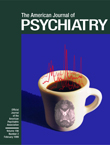Heritability of Anxiety Sensitivity: A Twin Study
Abstract
OBJECTIVE: In attempting to explain the familial predisposition to panic disorder, most studies have focused on the heritability of physiologic characteristics (e.g., CO2 sensitivity). A heretofore unexplored possibility is that a psychological characteristic that predisposes to panic—anxiety sensitivity—might be inherited. In this study, the authors examined the heritability of anxiety sensitivity through use of a twin group. METHOD: Scores on the Anxiety Sensitivity Index were examined in a group of 179 monozygotic and 158 dizygotic twin pairs. Biometrical model fitting was conducted through use of standard statistical methods. RESULTS: Broad heritability estimate of the Anxiety Sensitivity Index as a unifactorial construct was 45%. Additive genetic effects and unique environmental effects emerged as the primary influences on anxiety sensitivity. There was no evidence of genetic discontinuity between normal and extreme scores on the Anxiety Sensitivity Index. CONCLUSIONS: This study suggests that one psychological risk factor for the development of panic disorder—anxiety sensitivity—may have a heritable component. As such, anxiety sensitivity should be considered in future research on the heritability of panic disorder.



